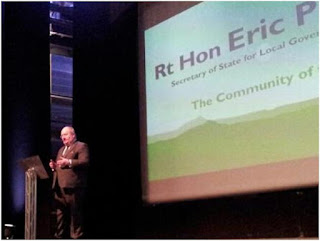Eric Pickles has been in the news again. He’s a busy man.
Almost exactly a decade before his reappearance, I attended ‘Herefordshire 2020: A Vision for the County’, a half day conference in Hereford. It was a brave attempt to demonstrate how the private and public sectors could work together for a positive future. The star of the show was the Secretary of State for Communities and Local Government, who gave a bizarre and disturbing performance.
The theme of Eric Pickles’ speech was that we need to get away from the central control of policy; we need to deregulate and stop the tick box mentality where there are regulations for everything. Make government officials with clipboards get a sense of perspective. On entering his department, he proudly told us, he gave his civil servants his three priorities; localism, localism and localism. “Localism will support growth and growth will support localism”.
His confidence grew. To a Parish Councillor trying to achieve change he chided, “Stop being a wimp ... go and kick the door down.” To a member of the local community arguing the case for extra funding, he chose not to use the platform to describe his policies or, like any good politician, use his authority to attempt to persuade local people that the government's approach was right. No. High on the stage, Mr Pickles silently, slowly and theatrically dug into his inside pocket, took out his wallet, removed a £5 note and threw it into the audience - who tittered uncomfortably. No-one spoke, the arrogance was literally breathtaking.
To support his devolution agenda, he created private sector led Local Enterprise Partnerships (LEP). Bizarrely, at the time, the Government was so obsessed with cutting costs, the Secretary of State with, 9,863 civil servants in his department and 15 of those earning over £100,000 pa, refused any financial support to help it build on its early success. At the time, the LEP remained without a single member of staff.
But then, Eric Pickles has always been a very busy man. Always been a supporter of small government, cutting red tape and against rules, regulations and clipboards.
Back in the Grenfell inquiry this week, Counsel said: “Your department was always subject to the deregulatory agenda and you are now seeking to recast that narrative and to underplay what was in truth an enthusiasm by your government for a deregulatory agenda, which led to a complete absence of proper checks and balances so far as concerns life safety.”
Despite his long record of deregulation, the now Lord Pickles replied: “I think that would be unkind.”

Comments
Post a Comment